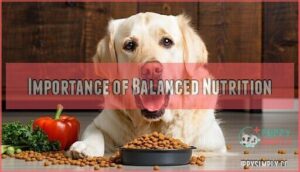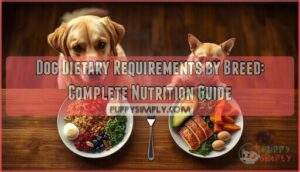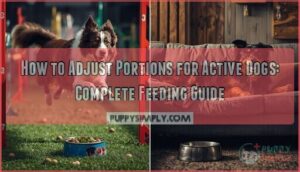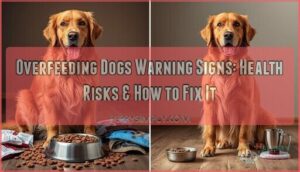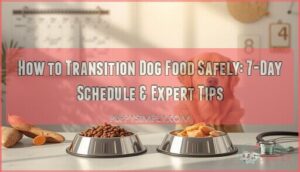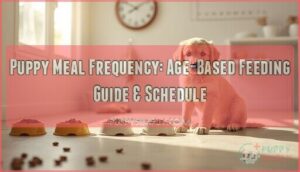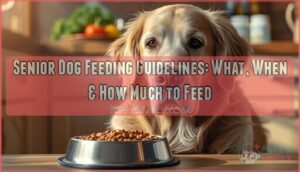This site is supported by our readers. We may earn a commission, at no cost to you, if you purchase through links.

Labs need quality animal proteins like chicken or fish, plus omega-3s for coat health and glucosamine for joints.
Top picks include grain-free formulas with controlled portions since Labs love to overeat. Look for brands that list meat as the first ingredient and avoid fillers like corn or wheat.
Your Lab’s age matters too – puppies need different nutrition than seniors.
The right food can prevent common Lab health issues like hip dysplasia and obesity, but there’s more to think about regarding portion control and feeding schedules.
Table Of Contents
- Key Takeaways
- Labrador Retriever Nutrition
- Top 8 Best Dog Foods
- 1. CANIDAE All Life Stages Dog Food
- 2. Wellness CORE Large Breed Dog Food
- 3. Taste Wild High Prairie Dog Food
- 4. Nutro Ultra Adult Dog Food
- 5. Orijen Grain Free Dog Food
- 6. Gather Free Acres Organic Chicken Dog Food
- 7. Eagle Pack Dog Food Chicken Pork Large Breed Adult
- 8. Purina Pro Plan Puppy Chicken Rice
- Addressing Food Allergies
- Nutritional Needs by Life Stage
- Choosing The Best Dog Food
- Frequently Asked Questions (FAQs)
- What is the best food for Labrador Retrievers?
- What is the 5 minute rule for Labradors?
- Which feed is best for a Labrador?
- What not to feed Labradors?
- How much should I feed my Labrador daily?
- What foods are toxic to Labrador retrievers?
- Can Labs eat raw or homemade diets?
- How often should I change dog foods?
- Should Labs take additional vitamin supplements?
- Conclusion
Key Takeaways
- Choose high-protein formulas with 25-30% protein from real meat sources like chicken or fish to fuel your Lab’s active lifestyle and maintain healthy muscle development.
- Look for joint-supporting ingredients like glucosamine and omega-3 fatty acids to prevent common Lab health issues like hip dysplasia and keep their coat shiny.
- Control portions carefully and feed twice daily since Labs love to overeat, which can lead to obesity and related health problems.
- Select age-appropriate nutrition as puppies need different protein levels (22-32%) than adults, and seniors require specialized diets with enhanced joint support.
Labrador Retriever Nutrition
Your Labrador needs the right fuel to stay healthy and energetic throughout their life.
Understanding their specific nutritional requirements helps you choose food that supports their joints, coat, and overall well-being.
High-Quality Protein Sources
Your Labrador needs quality protein sources to thrive.
Animal protein from chicken, beef, turkey, and fish provides complete amino acids essential for muscle development and energy.
These meat sources offer superior digestibility compared to plant proteins.
Look for labrador retriever food listing real meat as the first ingredient.
High protein dog food with 25-30% protein content supports your Lab’s active lifestyle and maintains healthy weight through balanced nutrition.
Ensuring a complete protein source is vital for your dog’s overall health and well-being.
Healthy Fats and Omega-3
Your Lab’s coat will thank you for including healthy fats in their diet.
Fish oil and other omega sources provide fatty acids that keep skin moisturized and fur shiny.
These nutrient balance boosters also support brain function and reduce inflammation.
Look for labrador retriever food containing salmon oil, flaxseed, or chicken fat as primary omega fatty acids sources in healthy dog food formulations.
Joint-Supporting Nutrients
Looking ahead to potential joint troubles, you’ll want dog foods containing glucosamine chondroitin for cartilage care.
These joint health powerhouses help maintain your Lab’s mobility as they age. Omega fatty acids also support joint function while reducing inflammation.
Quality canine nutrition includes these nutrients naturally, but many healthy dog food brands add extra amounts. This nutrient balance becomes your Lab’s insurance policy against common hip and elbow issues that plague the breed.
Considering the importance of joint supplements, this is key to understanding the role of joint health supplements in maintaining your dog’s overall well-being.
Balanced Carbohydrates
Your Lab needs the right fuel to keep their energy steady throughout the day.
Whole grains like brown rice and oats provide complex carbs that release energy slowly, preventing blood sugar spikes.
These fiber sources support healthy digestion while maintaining an appropriate glycemic index.
When choosing the best dog food for your labrador nutrition needs, look for recipes with moderate starch content rather than grain-free options.
Top 8 Best Dog Foods
Finding the right food for your Labrador starts with understanding their specific nutritional needs and energy requirements.
Here are eight top-rated dog food options that provide the balanced nutrition Labs need to thrive at every life stage.
1. CANIDAE All Life Stages Dog Food
CANIDAE All Life Stages offers versatile dog nutrition that grows with your Lab.
This food quality standout features multiple protein sources and grain-free options suitable from puppyhood to senior years.
You’ll find balanced nutrition without switching brands as your dog ages.
The formula includes joint-supporting ingredients and omega fatty acids that Labs need.
It’s a solid choice among top dog food brands for consistent, hypoallergenic nutrition.
2. Wellness CORE Large Breed Dog Food
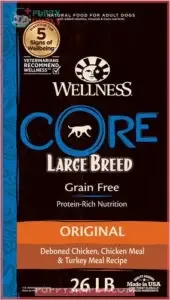
Wellness CORE targets large breed food needs with deboned chicken as the first ingredient.
This grain-free dog food delivers high-quality ingredients without fillers or by-products.
The nutrient balance supports healthy development in growing Labs while maintaining ideal weight.
Dog nutrition experts recommend this formula for its breed-specific benefits and premium dog food brands reputation.
3. Taste Wild High Prairie Dog Food

Taste of the Wild High Prairie delivers grain-free nutrition with real buffalo as the first ingredient.
This high protein formula includes wild ingredients like roasted bison and venison, providing exceptional food quality for active Labs.
Vet recommended for its hypoallergenic formula, it’s consistently rated highly by dog food advisor for superior dog nutrition.
4. Nutro Ultra Adult Dog Food
Beyond the usual protein suspects, Nutro Ultra Adult Dog Food combines multiple protein sources with superfoods for thorough adult nutrition.
This vet recommended formula addresses your Lab’s specific needs through quality ingredients.
- Triple protein blend – Chicken, lamb, and salmon provide complete amino acid profiles
- Superfood additions – Coconut, chia seeds, and kale boost nutritional density
- No artificial preservatives – Clean ingredients support peak pet health
- Balanced formula – Meets adult nutrition requirements without grain-free complications
5. Orijen Grain Free Dog Food
Orijen’s premium formula delivers exceptional dog nutrition through high-quality ingredients like fresh regional fish and free-run poultry.
This grain-free option helps prevent food allergies while supporting your Lab’s energy needs.
The hypoallergenic formula works well for sensitive dogs requiring a limited ingredient diet.
Orijen benefits include superior protein content and natural nutrients for peak pet health, with a focus on high-quality ingredients.
6. Gather Free Acres Organic Chicken Dog Food
Gather Free Acres delivers certified organic chicken nutrition that supports your Lab’s dog wellness through food safety standards you can trust.
This high-quality ingredients formula provides organic benefits without fillers or artificial additives. The limited ingredient diet approach makes it ideal as hypoallergenic dog food for sensitive Labs.
Perfect grain-free dog food option for adult dogs or puppy food labrador needs, supporting natural pet health. When selecting a dog food, consider the importance of organic certifications to guarantee high-quality ingredients.
7. Eagle Pack Dog Food Chicken Pork Large Breed Adult
Eagle Pack Dog Food delivers targeted nutrition for your Lab’s large breed needs.
This formula combines chicken and pork protein sources to support muscle development while addressing breed-specific requirements.
Key benefits include:
- High-quality ingredients sourced for ideal dog nutrition
- Breed size formulation specifically designed for large breeds
- Food quality standards that meet hypoallergenic dog food requirements
This formula provides balanced nutrition without grain-free restrictions, making it suitable across life stages from puppy food labrador needs to senior dog food requirements.
8. Purina Pro Plan Puppy Chicken Rice
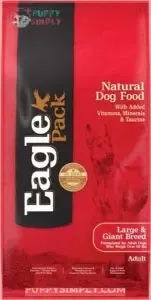
Purina Pro Plan Puppy Chicken Rice provides thorough puppy nutrition with real chicken as the primary protein source.
This formula supports healthy growth stages through balanced nutrients and easily digestible rice.
Unlike grainfree dog food options or hypoallergenic dog food varieties, this recipe focuses on ideal puppy feeding with highquality ingredients from premium brands for developing Labs, utilizing real chicken.
Addressing Food Allergies
Food allergies can turn your Lab’s mealtime into a guessing game, with symptoms ranging from itchy skin to digestive upset that’ll have both of you feeling frustrated.
The good news is that identifying common allergens and switching to hypoallergenic options can get your furry friend back to their happy, healthy self.
Common Allergens in Dog Food
Several allergen sources affect Labradors and can trigger food sensitivities or digestive issues.
Understanding these common culprits helps you choose the right hypoallergenic formulas for ideal pet health and digestive health.
Most Common Dog Food Allergens:
- Beef – The top allergen in 34% of cases, often found in standard dog foods
- Chicken – Causes reactions in 15% of dogs despite being in many commercial foods
- Dairy products – Triggers allergies in 17% of dogs
- Wheat – The primary grain allergen, responsible for 13% of grain allergies and meat intolerances
Switching to grainfree dog food with highquality ingredients can help manage these sensitivities effectively.
Identifying common allergy triggers is vital for selecting the best food for your Labrador.
Symptoms of Food Allergies in Labs
When your Lab experiences food allergy reactions, you’ll notice specific signs that signal trouble.
Your Lab’s body will send clear distress signals when food isn’t agreeing with them.
Skin issues like itchy skin, excessive scratching, and red patches appear first.
Digestive problems follow—think loose stools, vomiting, or gas that could clear a room.
Allergic reactions can also cause ear infections and paw licking.
These symptoms disrupt your dog’s comfort and your peace of mind, making proper pet health monitoring part of good dog care.
Hypoallergenic Dog Food Options
When food sensitivities persist, you’ll need hypoallergenic dog food options designed specifically for Labs with allergies.
These specialized diets use novel proteins and limited ingredients to minimize reactions while meeting your dog’s nutritional requirements.
Consider these hypoallergenic approaches:
- Novel protein sources – Duck, venison, or fish instead of common chicken or beef
- Limited ingredient diets – Fewer components mean fewer potential triggers
- Grain-free options – Eliminate wheat, corn, and soy allergens
- Hydrolyzed formulas – Proteins broken down to prevent immune responses
Veterinarian recommendations often include prescription brands that undergo rigorous allergy tests.
These grainfree options maintain a balanced diet while addressing sensitivities effectively.
For ideal results, understanding hypoallergenic dog food is essential in managing allergies.
Nutritional Needs by Life Stage
Your Lab’s nutritional requirements change substantially as they progress from energetic puppyhood through their golden years.
Understanding these life stage differences helps you select the right food formula to support their health and development at every age, which is crucial for their overall development.
Puppy Nutrition and Feeding
Growing puppies need more protein and calories than their parents.
Your Lab puppy requires 22-32% protein and 10-25% fat for proper development.
Feed four meals daily until four months old, then reduce to three meals by six months.
Measure portions carefully—Labs don’t self-regulate well.
Quality animal proteins like chicken, beef, and fish support muscle growth and brain development.
A well-planned holistic puppy diet is essential for ideal growth and health.
Adult Labrador Nutrition and Feeding
After your pup turns one, their dietary needs shift dramatically.
Adult Labs require precise nutrient balance to maintain their legendary energy and health.
Key feeding considerations for adult Labradors:
- Feeding Schedule: Two meals daily prevents bloat and maintains steady energy levels throughout their active days
- Nutrient Requirements: 25-30% protein with healthy fats supporting coat condition and immune support
- Meal Planning: Portion control is essential—Labs love food but need structured feeding tips to prevent obesity
- Breedspecific Nutrition: Include glucosamine, vitamins and minerals targeting their joint health and dietary needs
Senior Labrador Nutrition and Feeding
Aging dogs require specialized nutrition as their metabolisms slow down.
Senior diets for Labs should contain 28-32% protein to combat muscle loss while reducing calories to prevent weight gain.
Focus on joint-supporting nutrients like glucosamine and omega-3 healthy fats.
Enhanced vitamins and minerals boost immune support, while antioxidants help maintain coat condition and cellular health in elderly care.
Choosing The Best Dog Food
When choosing the best food for your Labrador, balanced nutrition isn’t just important—it’s everything.
Your vet’s guidance combined with understanding your dog’s specific needs will help you make the right choice for their health and happiness.
Importance of Balanced Nutrition
Nutritional balance forms the foundation of your Labrador’s lifelong health and vitality.
Quality ingredients support proper growth, maintain ideal weight, and prevent common health issues. When dietary needs align with balanced diets, your dog thrives with sustained energy and healthy digestion.
A well-planned diet should meet AAFCO nutrition standards to guarantee superior health.
- Protein-packed kibble fueling strong muscles and glossy coats
- Omega-rich formulas supporting joint flexibility and brain function
- Fiber-dense recipes promoting healthy digestion and weight management
- Vitamin-fortified blends boosting immune system and dog wellness
- Life-stage specific nutrition meeting changing nutritional needs over time
Consulting With a Veterinarian for Recommendations
Veterinary advice remains your best compass when choosing dog food for Labrador retrievers.
Your vet evaluates your dog’s health checks, weight management needs, and dietary restrictions during consultations.
They’ll recommend active dog food options matching your Lab’s lifestyle while considering affordable choices.
Professional pet nutrition guidance guarantees superior dog wellness through personalized recommendations based on your dog’s specific requirements.
When selecting a suitable diet, considering vet approved dog food options is vital for your pet’s health, as seen in vet approved products.
This approach ensures that your dog receives the best possible nutrition, leading to a healthy and happy life with personalized recommendations.
Frequently Asked Questions (FAQs)
What is the best food for Labrador Retrievers?
You’ll want high-quality dog food with 25-36% protein from animal sources, healthy fats like fish oil, and joint-supporting nutrients like glucosamine. Choose brands with whole grains and avoid fillers.
What is the 5 minute rule for Labradors?
Research shows 90% of puppy joint problems stem from over-exercising.
You’ll follow the 5-minute rule: exercise your Labrador puppy for 5 minutes per month of age, twice daily.
This prevents joint damage during critical growth phases and adheres to the 5-minute rule.
Which feed is best for a Labrador?
Look for high-quality protein (25-36%) from real meat sources, plus glucosamine for joint health.
Choose foods with omega fatty acids and avoid fillers—your Lab’s energy needs premium fuel, not cheap substitutes.
What not to feed Labradors?
Like chocolate being toxic to dogs, certain foods can poison your Labrador’s system.
Never feed chocolate, grapes, onions, garlic, xylitol, alcohol, or caffeine – they’re dangerous toxins that cause serious illness.
How much should I feed my Labrador daily?
Feed your adult Labrador 5-3 cups of quality dry food daily, split into two meals.
Adjust portions based on your dog’s activity level, age, and body condition to maintain ideal weight.
What foods are toxic to Labrador retrievers?
Dangerous delicacies definitely devastate dogs.
You’ll want to avoid chocolate, grapes, raisins, onions, garlic, xylitol (artificial sweetener), macadamia nuts, avocado, and alcohol.
These foods can cause serious poisoning or organ failure in your Lab.
Can Labs eat raw or homemade diets?
You can feed your Lab raw or homemade diets, but they require careful planning to guarantee nutritional balance.
Raw diets carry bacterial risks, while homemade meals need veterinary guidance to prevent deficiencies.
How often should I change dog foods?
Like knights of old who switched their steeds, you shouldn’t change your Lab’s food without good reason.
Stick with one quality brand unless there’s a health issue, digestive problem, or your vet recommends switching for age-related needs.
Should Labs take additional vitamin supplements?
Healthy Labs typically don’t need vitamin supplements if you’re feeding them quality dog food that meets AAFCO standards. Well-balanced commercial foods contain essential nutrients Labs require for peak health.
Conclusion
Choosing the best dog food for labrador retrievers isn’t rocket science, but it’ll make your Lab’s tail wag like a helicopter blade.
You’ve got the knowledge to select high-protein formulas that support their active lifestyle while preventing obesity.
Whether you’re feeding a bouncing puppy or a distinguished senior, prioritize quality proteins, omega-3s, and joint support.
Your veterinarian’s guidance combined with careful portion control will keep your Lab healthy and happy for years to come.
- https://www.munchbird.com/blogs/labrador-retrievers/the-best-balanced-meals-for-your-labrador-retriever-a-guide-to-optimal-nutrition
- https://dogacademy.org/reviews/dog-food/best-dog-food-for-labs
- https://americannaturalpremium.com/breed-guide/best-dog-food-for-labradors/
- https://www.prodograw.com/raw-feeding-guide/labrador-retriever-feeding-guide/
- https://www.petabolix.com/dog-breed-nutrition/dog-foods-for-labrador-retrievers





